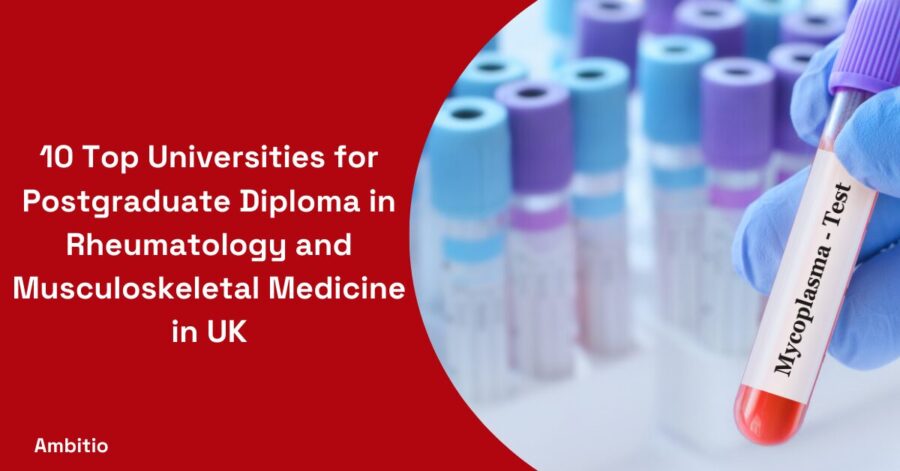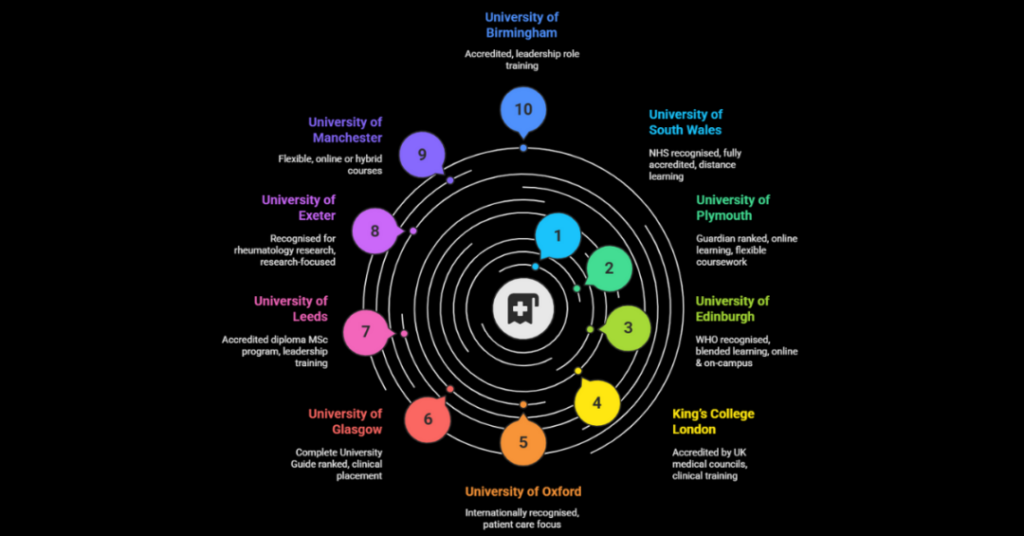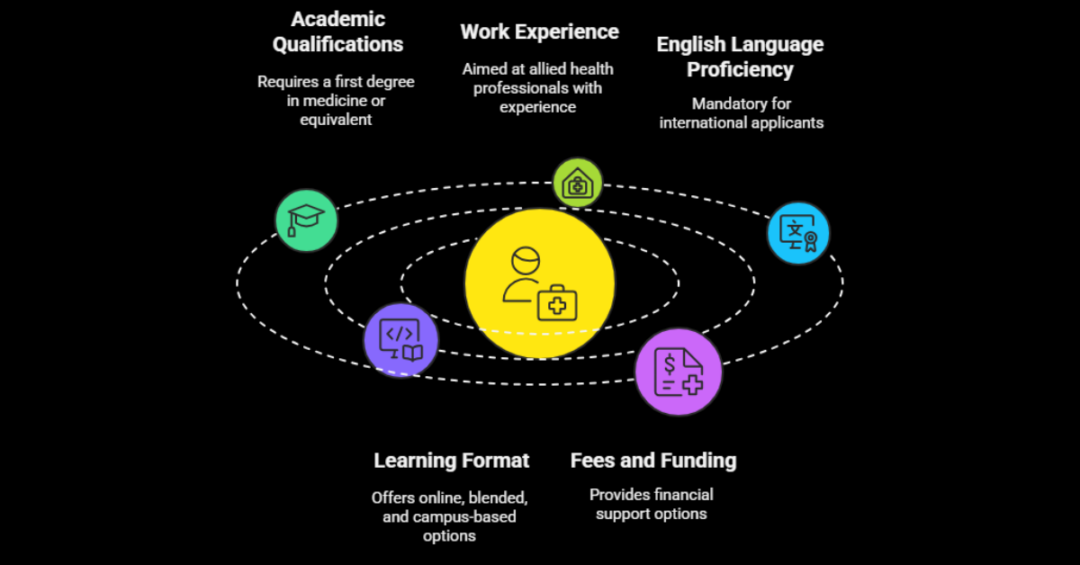12 September 2025
5 minutes read
10 Top Universities for Postgraduate Diploma in Rheumatology and Musculoskeletal Medicine For Indian Students in UK

Key Takeaways:
- The Diploma in Rheumatology UK provides health professionals with essential skills and knowledge to specialize in rheumatology and musculoskeletal medicine.
- Graduates gain a degree from a world-recognized institution, unlocking career advancement in roles such as rheumatology specialists and consultants.
- Flexible learning formats, including online and blended delivery, make the program accessible to professionals globally, including those with international qualifications.
Over 1 in 4 adults suffer from musculoskeletal disorders, making rheumatology a vital field. Healthcare professionals need advanced clinical skills, but finding a postgraduate diploma in rheumatology UK with online learning, career progression, and the right entry requirements can be tough.
Top universities like the University of South Wales and University of Plymouth offer diploma in rheumatology courses via online delivery. These postgraduate courses are designed for health professionals looking to enhance competency, meet international qualifications, and take on leadership roles in rheumatology and musculoskeletal medicine.
10 Top Universities for Diploma in Rheumatology and Musculoskeletal Medicine in UK
With the increasing demand for health professionals specializing in rheumatology and musculoskeletal medicine, many universities in the UK offer postgraduate diploma programs to enhance clinical skills and patient care. These programs, often available through online learning or blended delivery, are designed for physicians, physiotherapists, and allied healthcare professionals seeking career progression in this field.

Below is a list of the top universities offering a Diploma in Rheumatology UK, along with details on accreditation and study mode
| University | Accreditation & Recognition | Mode of Study |
|---|---|---|
| University of South Wales | Recognised by NHS, fully accredited postgraduate diploma | Distance learning, online delivery |
| University of Plymouth | Guardian University Guide ranked, offers online learning | Online learning, flexible coursework |
| University of Edinburgh | World Health Organization recognised institution | Blended learning, online & on-campus |
| King’s College London | Accredited by UK medical councils, provides clinical training | Full-time & part-time options |
| University of Oxford | Internationally recognised, focuses on patient care | On-campus with clinical practice |
| University of Glasgow | Complete University Guide ranked, strong in musculoskeletal medicine | Distance learning, clinical placement included |
| University of Leeds | Accredited diploma MSc program, leadership role training | Online postgraduate diploma |
| University of Exeter | Recognised for rheumatology research, aimed at health professionals | Blended mode, research-focused |
| University of Manchester | UK and international registered healthcare professionals eligible | Flexible, online or hybrid courses |
| University of Birmingham | Accredited education courses, leadership role including training | Online & on-campus, aimed at healthcare professionals |
What are the Eligibility and Entry Requirements for the Postgraduate Diploma in Rheumatology Course?
Given that rheumatology is an increasingly important field, the program ensures students can critically assess, problem-solving, and disseminate the evidence base to improve patient care.

Below are the key eligibility criteria and entry requirements for this diploma.
1. Academic Qualifications
Applicants must typically hold a first degree in medicine, physiotherapy, or an equivalent professional qualification. A first degree or equivalent from a world health organization recognised institution is required.
Candidates must demonstrate knowledge of rheumatologically related conditions and the responsibility of medical personnel in managing musculoskeletal disorders.
2. Work Experience & Professional Background
The course is aimed at allied health professionals, including occupational therapists, physiotherapists, and medical practitioners. Physicians need to be familiar with rheumatology patients and the extra responsibility of medical personnel in managing chronic diseases.
A satisfactory reference from a senior health care practitioner or line manager with knowledge of your work is required.
3. English Language Proficiency
For international applicants, proficiency in English is required. If English is not the first language, an IELTS score of a minimum of 5.5 or an equivalent qualification is mandatory. Applicants must demonstrate the ability to access information independently and use it to critically assess complex cases.
4. Learning Format & Course Accessibility
The course is run in various formats, including delivering online, blended learning, and campus-based options. Many courses are 100% accessible to both UK and international students, allowing for flexible learning outcomes.
The University of Plymouth’s program is particularly noted for being accessible to professionals interested in a leadership role.
5. Fees and Funding
The course fees vary by institution and may include financial support options. Some institutions offer funding for allied healthcare professionals to further their specialist knowledge in rheumatology and musculoskeletal medicine.
By meeting these requirements, students take on a rigorous learning environment designed to develop professionals who can access up-to-date research and critically assess rheumatology-related conditions. This diploma provides a structured course that aligns with the increasingly important role of medical personnel in managing rheumatology and musculoskeletal disorders.
Course Details and Curriculum Overview for Rheumatology Postgraduate Programme
Postgraduate diploma in rheumatology aims to develop professionals who can access information and utilize problem-solving techniques to tackle complex clinical issues. The program is aimed at health professionals from diverse backgrounds, including those holding international qualifications, who wish to broaden their knowledge in the increasingly important field of rheumatology.
The course is delivered with a focus on providing students with the skills and competencies needed to take on roles that carry extra responsibility in managing rheumatology patients.
Here is an overview of the Diploma in Rheumatology course details and curriculum:
| Module | Content | Learning Outcomes |
|---|---|---|
| Introduction to Rheumatology | Overview of rheumatological conditions, including common diseases. | Familiarization with a wide range of rheumatologically related conditions. |
| Clinical Assessment and Diagnosis | Techniques for evaluating patients with musculoskeletal complaints. | Ability to assess and diagnose rheumatological conditions. |
| Pharmacology in Rheumatology | Study of medications used in the treatment of rheumatological diseases. | Knowledge of treatment options and their clinical implications. |
| Advanced Rheumatological Practices | Focus on complex rheumatology cases and management strategies. | Develop skills to handle complex, multi-system diseases. |
| Health Systems and Access to Care | International qualifications and health systems relevant to rheumatology. | Understanding global health approaches and accessibility. |
| Professional Development | Aimed at students to take on leadership and managerial roles in healthcare settings. | Gaining the ability to lead and manage within a clinical setting. |
| Research and Evidence-Based Practice | Methods of conducting research in rheumatology and implementing evidence-based practices. | Ability to critically evaluate research and apply findings to clinical practice. |
What Are The Career Opportunities After a Diploma in Rheumatology UK?
The Diploma in Rheumatology in the UK is designed for health professionals who are interested in specializing in the diagnosis and management of rheumatological conditions. It provides knowledge of the wide range of rheumatologically related conditions and equips professionals with the skills needed to take on an increasingly important role with extra responsibility.
This course can be online, making it accessible to health professionals worldwide, including those with international qualifications. Graduates will earn a degree from a world-recognized health institution.
Here are some career opportunities after completing the Diploma in Rheumatology UK:
| Career Role | Key Responsibilities |
|---|---|
| Rheumatology Specialist | Manage and diagnose patients with rheumatological disorders. |
| Clinical Rheumatologist | Provide specialized clinical care in rheumatology. |
| Healthcare Manager | Lead healthcare teams focusing on rheumatology. |
| Medical Researcher | Conduct research on rheumatological conditions and treatments. |
| Rheumatology Consultant | Offer expert advice and support to other healthcare professionals. |
Conclusion
Diploma in Rheumatology UK is designed for health professionals, including those with international qualifications, who wish to specialize in rheumatology. This course provides in-depth knowledge of rheumatologically related conditions, equipping students with the skills to take on an increasingly important role in healthcare. Graduates will receive a degree from a world-recognized health institution, opening doors to advanced responsibilities and opportunities.
If you’re interested in advancing your career, Ambitio can help guide you through the application process and connect you with the right resources.
FAQs
What is rheumatology, and why is it important?
Rheumatology is a medical specialty that focuses on the diagnosis and treatment of musculoskeletal disorders and autoimmune diseases. It’s essential because these conditions can significantly impact patients’ quality of life, and early diagnosis and intervention are crucial for better outcomes.
Who is the diploma in rheumatology course aimed at?
The course is aimed at healthcare professionals who are interested in gaining specialized knowledge in rheumatology and musculoskeletal medicine. This includes physicians, physiotherapists, occupational therapists, and other allied healthcare professionals.
Can international healthcare professionals apply for this course?
Yes, the diploma in rheumatology program is open to both UK and international registered healthcare professionals. However, international applicants may need to demonstrate English language proficiency and meet other requirements.
What are the career prospects after completing the diploma in rheumatology?
Graduates of this program can pursue leadership roles in rheumatology and musculoskeletal medicine. They can work in hospitals, clinics, and research institutions, or even take on teaching positions to disseminate their knowledge.
Is financial aid available for this postgraduate course?
There may be funding options available, including scholarships and grants. Prospective students are encouraged to contact the University of South Wales for information on financial assistance opportunities.
How has the field of rheumatology evolved over the years?
The field of rheumatology has evolved significantly with advances in medical research and technology. New treatments and diagnostic methods have emerged, allowing for more effective management of rheumatological conditions.
Are there any specific research opportunities within the field of rheumatology?
Yes, there are numerous research opportunities in rheumatology. From studying the underlying mechanisms of autoimmune diseases to conducting clinical trials for innovative treatments, research in this field is diverse and impactful.

You can study at top universities worldwide!
Get expert tips and tricks to get into top universities with a free expert session.
Book Your Free 30-Minute Session Now! Book a call now




























